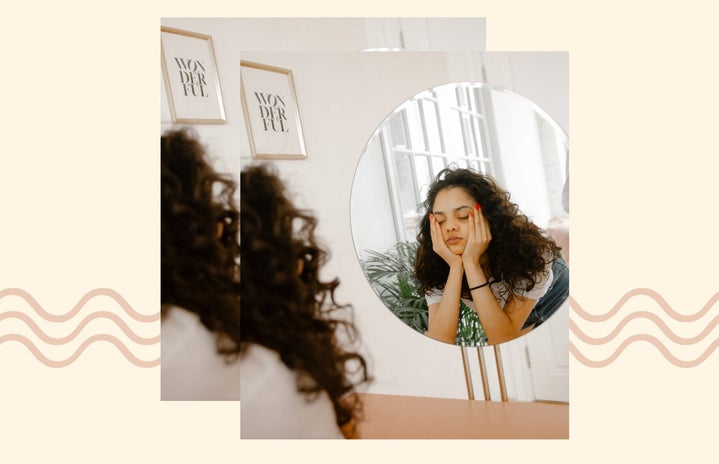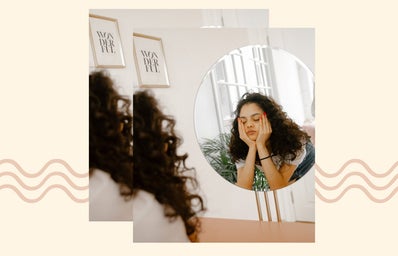Growing up, I couldn’t help but wonder why my thighs looked bigger than any of my friends at the playground or why I couldn’t do fashion shows with my friends at a sleepover. As I grew older, I only saw the gap dividing further between the type of body I wanted and the one I had. Why couldn’t I have the modelesque legs my friends had, instead of hating the way shorts fit me at the mall?
Ever since I could remember, I have struggled with body image. My double chin in photos or having to move a jean size up made me feel like I was less of a person. Truthfully, my struggles with body image grew worse when I became active on social media. Even today I struggle with seeing the perfect posts on Instagram.
Apparently, I am not alone. It has been shown in a study that adolescent girls who shared more photos online, such as selfies, and used more photoshop felt worse about their appearance and exhibited greater eating concerns. Additionally, in another study analyzing undergraduate college students, scientists found that those who viewed appearance-based photos on Instagram were more likely to experience a negative impact on mood, body image and self-esteem than those who viewed non-weight related content.
I realized how bad social media made me feel about myself when I started to obsessively count how many likes I got and take forever to post anything because I was trying to find a picture where I looked thin. Last year, I had finally decided I had enough of it. I no longer was going to allow myself to compare my body to some random girls on social media.
I did a social media cleanse where my initial goal was a month break from all social media apps; however, I ended up extending it to almost six because I felt more centered. While my poor body image didn’t just disappear, I felt more confident in how I looked because I was only using myself as a comparison.
Once the pandemic started and lockdown kept me indoors every day, the social media itch returned. The second I opened Instagram after being away for so long, I realized that I had made a mistake. I was easily sucked right back into comparing my arms to the long, thin arms I always was so envious of. With the gain of the ‘quarantine 15’ and the stress of everything going on, I hit my all-time low in terms of body image.
Maintaining a positive body image is already hard enough, much less in the middle of a pandemic with social media bombarding us with videos and images of modelesque people. Poor body image and less social support due to the pandemic can create the perfect storm for damaged mental health.
That’s why it is important now more than ever to silence your inner critic. What is an inner critic? It’s that nagging voice in your head that falsely makes you believe you aren’t good enough. Most of the time that I do listen to my inner critic, I end up being harsher to myself than I ever would any of my friends.
Before the pandemic, I would silence my inner critic by catching up with old friends that I knew would lift my mood. Unfortunately, with the pandemic limiting social gatherings, this kind of social support is no longer available. However, support can come in different forms. It can be a telehealth appointment with a therapist or a Facetime party with friends. While it may not be what you are used to, simply talking to someone about how you feel can work wonders.
Another thing that helped me to confront my inner critic was to diversify my social media feed. Instead of following pages that feature the same types of bodies and personalities, I started to follow pages that showed beauty comes in many forms. This was the most helpful move for me because we have all been conditioned to view a certain body shape as ‘beautiful,’ so I was actively working to undo that conditioning. Now when I go to compare myself to those in my social media feed, I don’t feel as intimidated or different. This is especially important when you may be on social media more than you used to due to the pandemic.
The last thing I did to silence my inner critic was to be more compassionate to myself. Anytime I would look in a mirror and start to critique myself, I would automatically transition to doing something else. By transitioning to doing something else, such as running or journaling, distracted me from the negative thoughts. Additionally, it provided me reasons to be thankful for my body. After all, without it, I wouldn’t be able to do the things I love. I highly recommend a gratitude journal (like this one) because it encourages you to see through the ‘glass half full’ perspective versus the ‘glass half empty.’
I still don’t have the best perception of my body, but I am slowly unlearning toxic habits and learning how to love the parts of myself I don’t particularly like. It isn’t always going to be sunshine and rainbows, especially in the middle of a pandemic, but there is hope.
If you are struggling with your body image during the pandemic, you are not alone. Seek support from your friends and family. If you find that you need help from a therapist or a medical professional, the University of Florida (UF) Counseling and Wellness Center and the UF Student Health Care Center are offering telehealth appointments you can access from anywhere.


